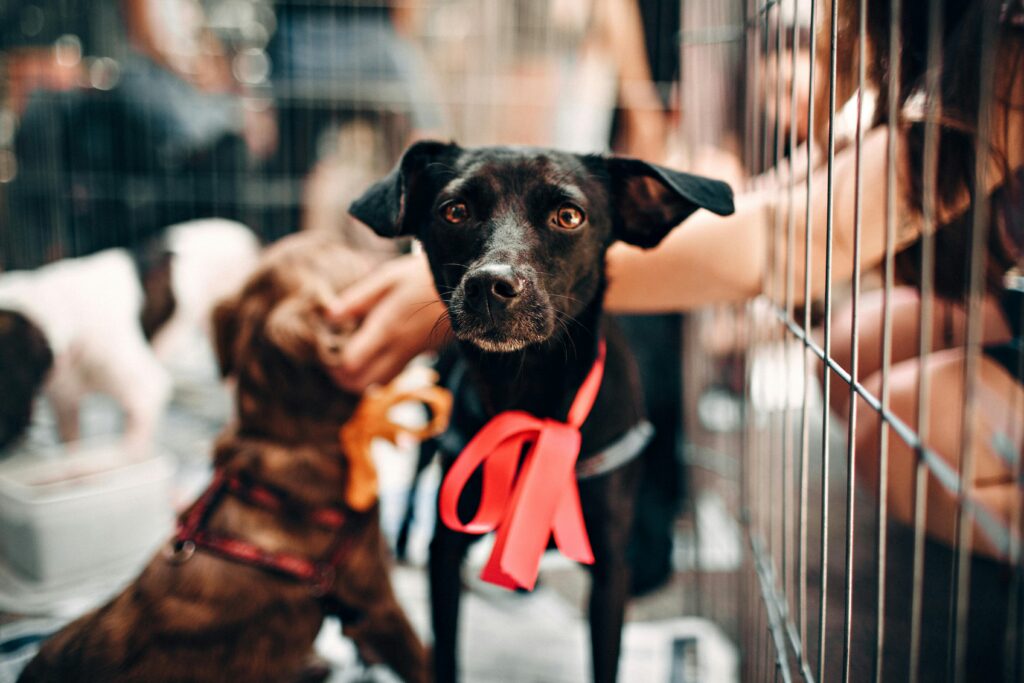Choosing the right dog for your family is an exciting, life-changing decision, but it’s also one that requires careful consideration. Whether you’re adopting your dog from a shelter or purchasing a puppy from a trusted breeder, it’s important to do your research first. In this guide, we’ll walk you through the process so you can bring home a happy, healthy pup.
Dog Breeders vs. Rescue Centres
Choosing between adopting a rescue dog and purchasing a puppy from a breeder is a personal decision, and both options have their advantages and considerations.
Rescue Centres:

Pros: Adoption gives a dog a second chance at a loving home, and you’re often helping to reduce overpopulation in shelters. Many rescue dogs are already house-trained and may have some basic socialisation skills. Not only are you saving a life and giving unconditional love to a dog that really needs it, but you’ll also enjoy lower costs when compared to buying from a dog breeder.
Cons: Adopted dogs may come with unknown histories, which could include past trauma or medical conditions. Some rescue dogs may also require more patience and training to adjust to their new home. If you have young children or other pets, it can take a while to find a suitable match.
Dog Breeders:
Pros: Breeders can provide more predictability in terms of a dog’s temperament, size, and health. If you’re looking for a specific breed with certain traits or qualities, a breeder can help you find exactly what you’re looking for. A good breeder will know everything about their puppies’ health and breeding history and will provide a high level of care from the moment they are born.
Cons: Purchasing a dog from a breeder can be a significant financial investment, and it can sometimes be challenging to distinguish reputable breeders from less responsible ones. Additionally, while “purebred” dogs often come with specific traits, some breeds are more prone to hereditary health issues, such as hip dysplasia, heart defects, and epilepsy. These conditions can affect your dog’s long-term health and wellbeing, which is why it is essential to research both the breed and the breeder’s practices before making a decision.
How do I find a reputable dog breeder?

Dog breeders are dedicated professionals with a high level of knowledge in a specific breed. They are committed to producing healthy dogs that adhere to established breed standards. Choosing the right breeder is a crucial step in finding a happy, healthy pup. From health and genetic testing to breeding ethics, here are the key qualities to look for in a dog breeder.
Health and Genetic Testing
A responsible breeder conducts genetic testing and health screenings to ensure they are free from hereditary conditions. Before choosing a breeder, ask to see health certificates for both parents alongside evidence of testing for common breed-specific health issues.
Socialisation and Care
Puppies should be raised in a clean, safe, and stimulating environment. A responsible breeder will expose puppies to various sounds, sights, and experiences to ensure they are well-socialised before going to their new homes. They should also be committed to providing proper veterinary care, including up-to-date vaccinations and deworming.
Questions and Transparency
A good breeder should be open and willing to answer questions about the breed, the health of the puppies, and their breeding practices. They should also provide you with a clear contract outlining health guarantees and the responsibilities of both parties.
Breeding Ethics
A reputable breeder only breeds dogs for the right reasons, not for profit or to meet high demand. They should be passionate about improving the breed and only breed dogs that meet health and temperament standards.
What should I know about adopting a rescue dog?

Adoption is a wonderful way to find a dog while giving a deserving pet a second chance. Shelters and rescue organisations often have a wide range of dogs in various shapes, sizes, and breeds, all in need of loving homes. At K9 Heaven, we proudly support the work of New Zealand’s incredible rescue centers including Rottie Rescue, Paws Restart and Sweet Noah. If you’re considering adoption, these organisations are a great place to start, offering loving dogs in need of a second chance. Below, we’ll look at the key things you’ll need to consider when adopting a rescue dog.
Variety of Dogs
Shelters have dogs of all sizes, ages, and temperaments. Some may have been sent there by their previous owner, while others could have been strays or rescued from difficult situations. When visiting a rescue shelter, be ready to meet dogs of various breeds and backgrounds.
Adoption Process
Before introducing you to a dog, shelters want to ensure that they have found the right match. The adoption process typically involves filling out an application form, meeting with a shelter worker, and sometimes a home visit. Be patient with the process and be prepared to provide details about your living situation, family, and experience.
Health and Behaviour Assessments
Many shelters conduct behavioral assessments and basic health checks on the dogs they take in. However, some dogs may have a history of trauma or medical issues that require extra care and attention.
Adoption Fees
Adoption fees vary depending on the shelter or rescue group, but they typically cover the cost of spaying/neutering, vaccinations, and other veterinary care. These fees are usually lower than purchasing a dog from a breeder and help support the organisation’s mission and operations.
How to Spot a Puppy Mill
Puppy mills are unethical breeding operations that focus on profit rather than the health and well-being of dogs. These facilities typically house a large number of dogs in overcrowded, unsanitary conditions. But, before you worry about accidentally using a puppy mill, here are the key warning signs to look for.
- Lack of Transparency: If the breeder is hesitant to answer your questions or refuses to provide information about the puppy’s parents, health history, and living conditions, this is a red flag. Reputable breeders will be open and transparent about their practices.
- Too Many Puppies: A breeder that has multiple litters of puppies for sale at once, especially in different breeds, may be running a puppy mill. Responsible breeders typically focus on one or two breeds and only have a limited number of litters each year.
- Poor Living Conditions: Puppy mills often have unsanitary and unsafe living conditions. If puppies sit in cramped cages, have little socialisation, or appear unhealthy, this is a major warning sign. Visit the breeder’s facility and ask to see the living conditions before making any commitments.
- No Health Guarantees: Puppy mills tend to neglect proper veterinary care and may not provide health guarantees for the puppies they sell. Reputable breeders should offer a health guarantee and provide documentation of vaccinations, deworming, and any necessary medical treatments.
Dog Breeders vs. Rescue Centres: Next steps…
Finding a reputable breeder or rescue shelter is essential for bringing home a healthy, happy doggo. Whether you choose to adopt from a shelter or purchase from a breeder, it’s important to do your research, ask the right questions, and choose the best option for you and your family. Stay informed throughout the decision-making process, so that you can set the foundation for a loving and successful relationship with your new dog.

